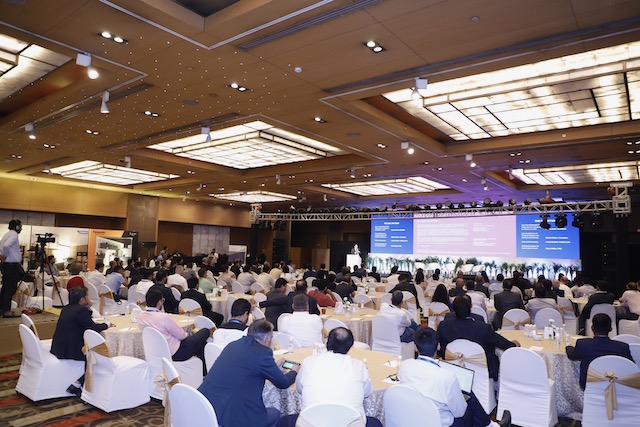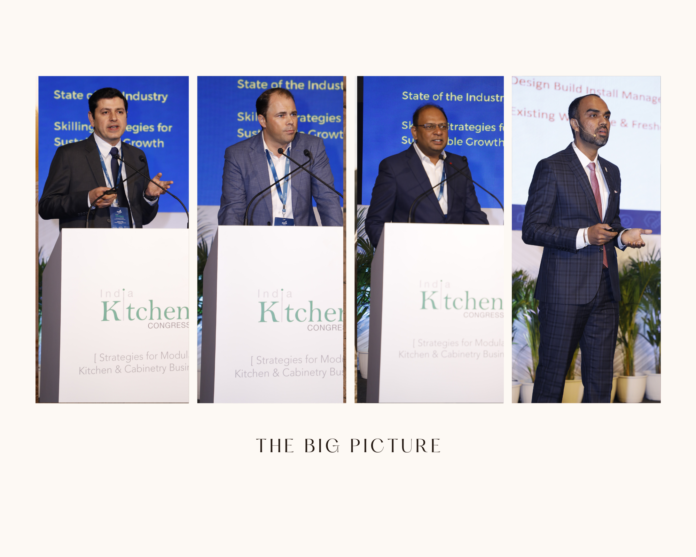Back after a hiatus of two years India Kitchen Congress 2023, the much-awaited conclave of the Indian kitchen and cabinetry industry, brought together all the stakeholders under one roof. The in-person gathering saw discussions ranging from supply chain constraints to challenges posed by new-age AI-led technologies, the imperative to become a global hub for skilled manpower, the resilience of the realty sector and growth forecasts for the next few years. The inaugural session – The Big Picture – set the tone.
Speakers for the inaugural session were Gaurav Wahi – Senior Director, ANAROCK Property Consultants; Nitesh Mathur – Vice President, Crompton Greaves Consumer Electricals Ltd; Andre Eckholt – Managing Director, Hettich India; and Rahul Mehra – CEO, Furniture & Fittings Skill Council (FFSC). Together these leaders painted the larger context of the industry and set the agenda for sustained growth.
Resilient Real Estate
The session began with ANAROCK’s Gaurav Wahi sharing insights on the Indian real estate industry and how it is expected to perform over the next few years. He highlighted that despite stress in the economy, the real estate sector has witnessed significant growth over the last decade. In this period, it has grown three-fold, from an inventory value of $94 billion to $275 billion. What brought cheer to the industry captains was the fact that the residential sector has witnessed a 5.2x growth over the last decade and that it is now dominating the real estate sector.
The industry is gradually coming out of the woods, having been hugely impacted by the pandemic over the last two years. Wahi highlighted that 2022 was a benchmark year, in that residential growth surpassed the peak of 2014. He brought to light how in the last 3-4 years, launches have been fewer while sales have been higher, and growth has been demand-led. There were about 3.5 lakh units of new launches – a benchmark number for 2022. The markets of Mumbai Metropolitan Region (MMR), Bengaluru, Hyderabad, Pune and Kolkata witnessed an increase in new launches. As for sales, they have been exceptional across the top seven cities with MMR and Delhi-NCR accounting for the maximum numbers.

Of special interest to the kitchen industry was the fact that Rs 3.3 lakh crore worth of inventory was sold in 2022 of which the lion’s share, approximately 48 per cent or Rs 1.5 lakh crore, was accounted for by MMR followed by Delhi-NCR at approximately Rs 50,000 crore. The inventory overhang has been coming down in the past few years due to resilient sales, and fewer launches. Today the inventory overhang is less than 24 months across the top seven cities – a very favourable factor for the real estate industry.
Quite interestingly, the share of luxury and ultra-luxury segments has doubled in the last three years from around 9 per cent to now 17-18 per cent, whereas affordable segment launches have halved from around 40 per cent to 20 per cent in the same period.
The outlook for the industry looks bright. Residential sales will be resilient, supply is likely to lag sales, and there will be major launches from large, listed developers who have developed strong pipelines. The average price appreciation will be in the range of 5-8 per cent, consolidation of large developers shall continue, and they will have a larger share of the total area sold, maybe in the range of 34-35 per cent in 2023.
Consumers Seek Experiences
With the state of residential realty as the context, Crompton’s Nitesh Mathur took over to dwell on how appliances are changing the kitchen’s architecture and consumer behaviour. He stressed how post-Covid the kitchen has taken centre-stage, and that ahead of design, consumers are concerned about sustainability, functionality, and convenience. In his 10-min keynote address, which was no less than a strategy lesson for the kitchen retailers, Mathur emphasised that it was the responsibility of the industry to provide an ecosystem that helps fulfil consumer needs in a better and more efficient manner.
ALSO READ: Manufacturing for Flexibility and Efficiency
With the rise in realty prices, the sizes of apartments and thereby the kitchen have fallen. “One possible directional flow is the use of multiple appliances combined into one – one which is more precise, and which can help people to use it with greater sensitivity.”
Sharing insights into consumer behaviour, Mathur said they seek a wholesome kitchen buying experience and that there is a dearth of players who focus on offering fully integrated kitchens. While some sellers are heavily focussed on the appliances, others specialise in kitchen furniture. “This is an unmet need that the industry must look into.”
Mathur shared the findings of a study that Crompton had commissioned to gain more insights into consumers’ buying behaviour. Consumers visit a multi-brand outlet to compare prices. They visit a modern trade outlet so that they can get to know the specifications of the products and an exclusive brand store for product experience. Those who are on the upper side of the price pyramid and are clear about their needs visit a modular kitchen studio. People who visit a modular kitchen studio have the highest conversion, approximately 69 per cent.
He exhorted the kitchen industry to build a value proposition – look at insights based on retail experience (realign the retail experience); and plan, promote and execute an effective pricing strategy. “The focus should be on the quintessential marketing mix, the four Ps.”
Personalisation is the Key
While presenting the state of the industry, Hettich’s Andre Eckholt dwelt on the megatrends impacting the industry – urbanisation, individualisation, and sustainability.
When it comes to individualisation there is a growing desire to customise the kitchen and furniture in terms of form and looks. To be successful we need to take individualisation as the new standard, he said. Consumers are looking for unique and personalised kitchen designs that reflect their tastes and lifestyles. “As a result, we can expect to see more companies offering customised options and bespoke kitchen design services in the future,” he said.

Talking about urban homes, Eckholt made a realistic observation. Homes in the urban environment are getting smaller, the use of space and furniture is becoming more versatile, and if players want to be successful it is important to come up with solutions that facilitate the customer’s transformation, flexibility, and multi-functionality. More importantly, consumers in India are looking for eco-friendly products and services in the kitchen, and this means an increased focus on sustainable materials and energy-efficient appliances.
Sharing insights about the market, he emphasised that India is already a large furniture manufacturer and consumer; it stands among the top five when it comes to supply and demand. The low per capita consumption of furniture points to a huge potential for growth; however currently local production capacities and capabilities are not meeting the rising demand. Hence the industry is dependent to a certain extent upon imports.
“The market for modular kitchens and cabinetry in India is highly competitive, with both international and domestic players vying for a share of the market. Indians are willing to spend a larger proportion of their home improvement budgets on kitchens,” observed Eckholt. “I believe there is a great opportunity to be the next global furniture hub.” Watch Eckholt’s 20-minute address here.
Skilled Manpower a Challenge
If India is to emerge as a global hub for kitchen and cabinetry solutions, the industry must get its skilling act together. FFSC’s Rahul Mehta reflected on why skill development is the need of the hour for the government, the industry as well as individuals, to ensure sustainable growth. Urging the industry to build a ‘collective consciousness’, he said that we are faced with a great opportunity to profitably make in India through strategic import substitution and export promotion.
Mehta was vocal in his call for making India the skill capital of the world and urged industry captains to join hands in the mission. “The government is creating the necessary framework and environment. It is equally important for the industry and academia to put in their bit and collaborate on this ambitious project. This is an era of specialisation, and we ought to work towards this.”
Dwelling upon a very pertinent issue, Mehta said the current workforce was unaware of the career options offered by the vibrant furniture industry, there was no aspiration to join the industry, and those who became woodworkers did so because there was no other option left.
The verdict of The Big Picture was simple. The market is resilient, and the Indian kitchen and cabinetry industry must take advantage of global developments – strengthen manufacturing and supply chains, provide consumers with specialised and experiential solutions, collaborate to set up Centres of Excellence and contribute towards building a globally competitive skilled workforce.
India Kitchen Congress 2023 is proud to have Hettich India as platinum sponsor, Crompton Greaves Consumer Electricals as gold sponsor, Panasonic Homes & Living as silver sponsor, and Furniture & Fittings Skill Council as the knowledge partner.


